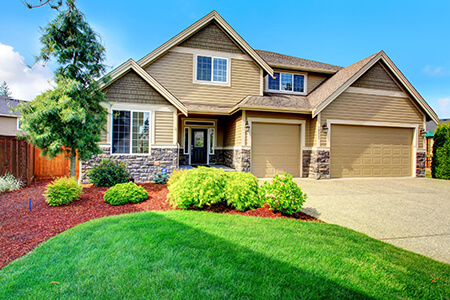Homeowner’s insurance offers protection if your home or personal possessions are damaged. Home insurance policies give you coverage against damage or loss caused by storms and severe weather, vandalism, and theft. Depending on the policy, your home insurance may also cover compensation for accidents that occur on your property.
Compare Car Insurance Quotes and Save!
Overview of How Homeowner’s Insurance Works
Homeowner’s insurance is a type of insurance that covers damages and losses to your home. When you buy a homeowner’s insurance policy, you pay the insurance company a premium. The insurance company then agrees to pay for certain types of damage or losses outlined in your policy.
Policies also typically have deductibles. After filing a claim, the insurance company subtracts your deductible before sending you the payout.
Do You Need Homeowner’s Insurance?
States don’t require homeowners to obtain home insurance. However, most lenders do. If you plan on getting a mortgage, you’re likely going to need homeowner’s insurance.
Lenders need to protect their investments, which they can do with an insurance policy. If your home is damaged by a covered event, the insurance company covers the repairs and your home doesn’t decrease in value.
After paying off a mortgage, keeping a homeowner’s insurance policy is still recommended. Along with covering repairs for unexpected events, your insurance may cover the costs if someone takes you to court for injuries that occur on your property.
How Long Does a Home Insurance Policy Last?
Most home insurance policies have a length of 12 months. However, they also typically renew automatically each year.
Do Rental Properties Need Homeowner’s Insurance?
Property owners who rent to tenants typically obtain landlord insurance. As with homeowner’s insurance, landlord insurance covers damage to your property. It also often includes liability coverage for accidents and injuries.
What Does Homeowner’s Insurance Cover?
Most policies include coverage for your home’s structure, which includes your roof and siding. Other structures, including garages, sheds, and fences may also be covered.
Policies also cover different types of events. You’re likely to get coverage for damage from fires, storms, theft, and vandalism.
Liability coverage is also common for homeowner’s insurance. With liability coverage, the insurance company pays medical expenses and other costs when someone is injured in your home or yard.
Are Home Insurance Payments Tax Deductible?
Home insurance payments aren’t typically tax deductible. However, in some situations, using your home as your place of business may qualify you to deduct a portion of your home expenses, which may include your home insurance payments.
Conclusion
Homeowner’s insurance isn’t required by law but offers protection against a wide range of events. You can add protection against fire, weather-related damage, vandalism, and other incidents. Many lenders also require a home insurance policy, making it essential for the typical homeowner.



